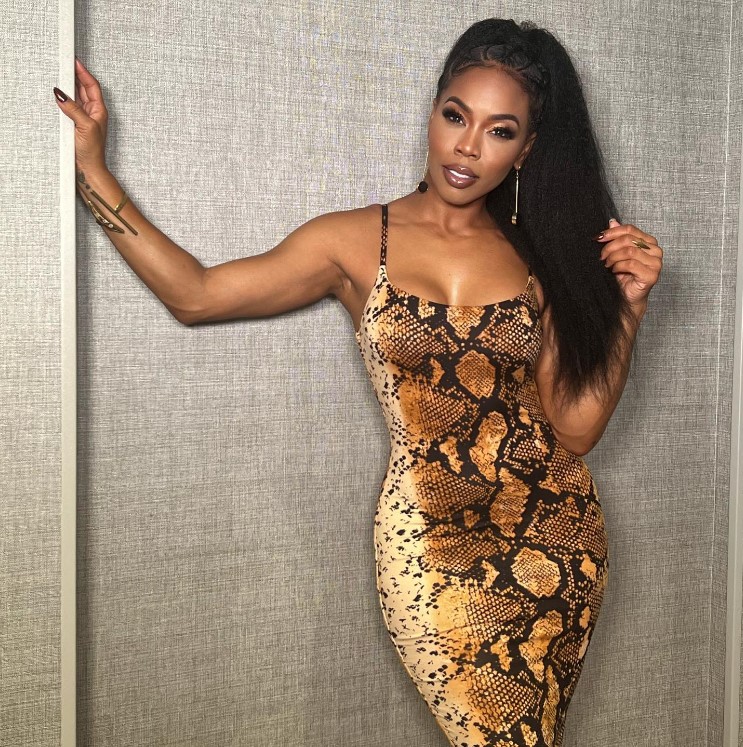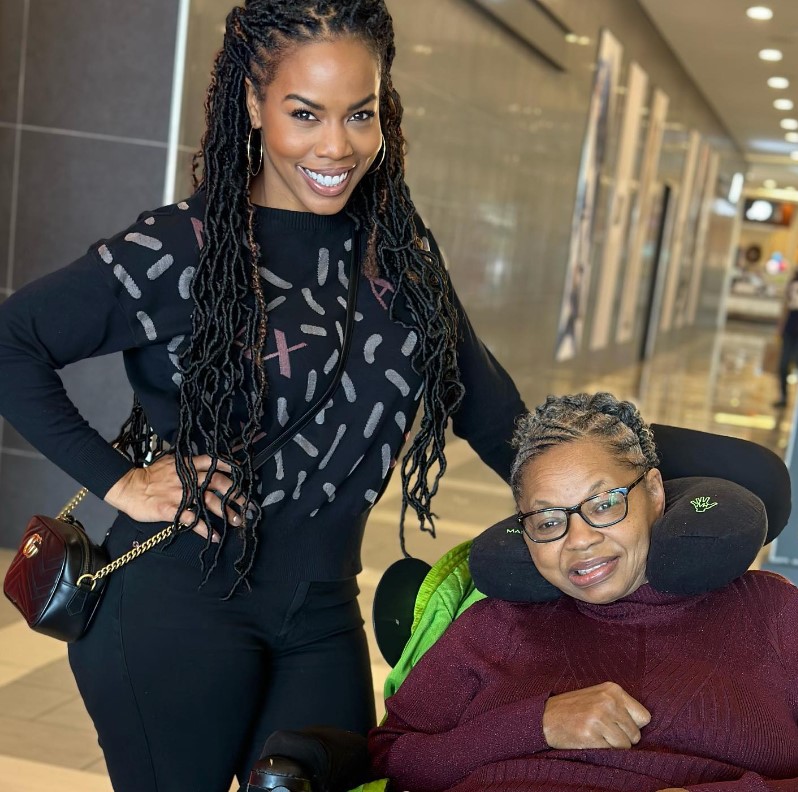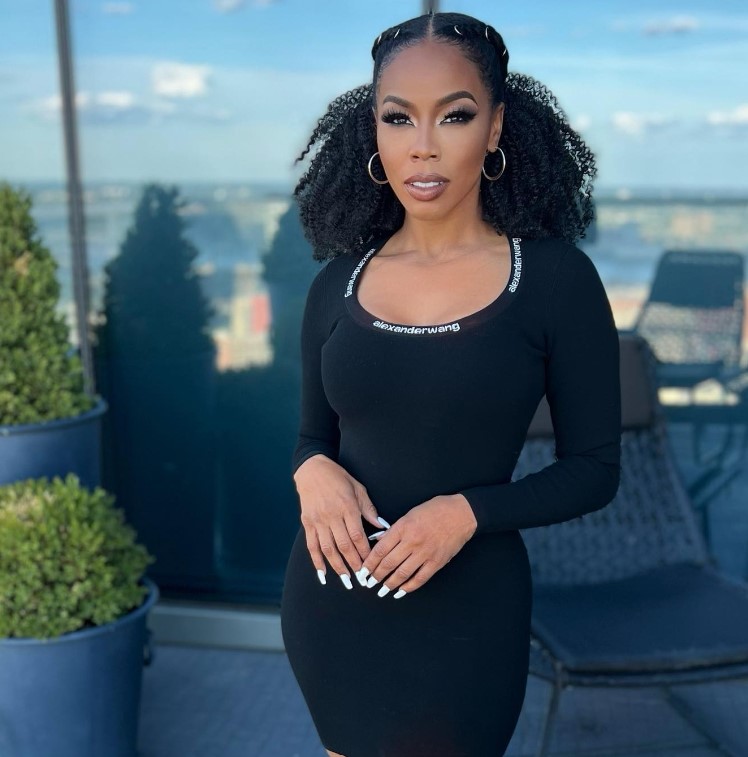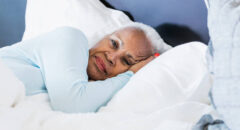
I was very touched by the story. Brandee Evans, after speaking with her, has a very wonderful spirit and caring personality. It was great speaking with her and hearing how things used to be and how they are now caring for her mother. As we grow up, we have this view: my parent(s) is supposed to care for me. But there are many times when we must step up to care for our parent(s) in times of need.
Q: Tell me a little about yourself and how MS has personally impacted you and your mom.
A: Thank you for having me. So I’m a full-time caregiver to my mom, who has multiple sclerosis, and girl, it has been one of the most challenging yet rewarding roles I’ve ever had. I know much more today than when mom was diagnosed in 2004. So I’m just excited to share the knowledge with others in the Black MS community. And you know, today, I am a proud, proud partner with Genentech as a paid spokesperson to join their MS visibility campaign that celebrates diversity in MS and provides culturally relevant resources to enable better MS care.
Q: When your mom was first diagnosed, how was that for her? And then what made you decide to be the one to take on this role for your mom?
A: So when she first got diagnosed, it was 2004. I’m just going to be honest with you, I was in denial. I was delusional. I thought that mama was being dramatic. Just because I had never heard of this. What is MS? Like, what is Multiple Sclerosis? So it was very, very tough. She and my dad were together at that time too. And so, it was the falls. She was falling a lot. She was having pain in her hand, so she thought it was carpal tunnel issues because she was a secretary at the time. And the doctors were like, oh, well, just lay off the keyboard a little bit. She was driving a lot too. But it was crazy because she was hitting things.
She would have a lot of wrecks. That part, too, was starting to be disturbing because my mom was a great driver. And it was just like, so you just running into the door now, like, what is happening? But that was her losing control of her legs and things. Why am I feeling just so hot she had asked us at one point. And we were like, is it menopause? You just have a hot flash, and it’s just like, no, MS patients get really hot; the heat is kryptonite. So it was just a rollercoaster ride. And honestly, of the emotions of us just not understanding the disease, not understanding mom at the time, and dear God, in hindsight, if I could go back, I would do it so differently. I can honestly only imagine how afraid she probably felt and confused because no one really had answers.

Q: So what did the day-to-day look like then? And what does it look like now?
A: Day-to-day, in the beginning, was unpredictable. Like, ok, maybe mama’s stressed. We’re just trying to figure it out. Day-to-day now is completely different. Mom is completely immobile. She can still reach her hands just a little bit to scratch her shoulder, maybe. But she’s not able to walk. She can barely talk. She’s immobile from the waist down. She’s incontinent. It is secondary progressive MS at this point where it has just deteriorated her very fast.
RELATED: P-Valley Star Brandee Evans on being a Caregiver for Her Mom: “It’s Bittersweet”
Q: Are you an only child, or do you have other siblings that help out a little bit?
A: I am the only girl, so I am doing it all. And, I will say, too, there was a time, and I’m honest with my brothers about this, so I don’t mind sharing. There was a time when I thought my brothers didn’t care. That is not the case. They are absolutely there for my support. It was a lot for them, you know what I mean. They’re there to support me and mom with anything we need. And it’s just that strong Black woman in us is there for real. But I was the one called for this job. So I’m the one that decided to get mama out of the nursing home and bring her to California with me, where I just knew that I could get better care.
In California, people talk more about MS than they do in the south. It’s so weird to me. And it’s so funny. I’m a part of the #MSVisibility campaign and we just did this amazing sit-down, they had an opportunity to sit down with an incredible group of women. Azure Antoinette, who was diagnosed in 2009, upholding advocate Dr. Mitzi Joi Williams, a neurologist, and MS Specialist Victoria Reese, founder of We Are Ill and diagnosed in 2012. We all were able to sit down and then to find out after you talk, that Dr. Mitzi’s, a doctor in Georgia. I didn’t know this when I had mama in Georgia, you know what I mean? Because I feel like people aren’t talking. I’m really excited to be a part of this program, to talk more about it and just show and discuss the different studies in the Black community with MS because it is not the same as others, we’re celebrating diversity in MS and we’re not really talking about it the way we should.
This is unfortunate as I think that goes for a lot of illnesses. There’s just not enough knowledge out there that should be.
Yeah. But you know what, they sure know a lot about cancer. Cancer gets a big platform and I just feel like MS, all of them are horrible, but when people say they have cancer, they’re like, oh my gosh, they know exactly what you mean. If you walk up to people and you have multiple sclerosis, it’s what is that? So I’m very proud to be a part of this visibility campaign and hopefully, we can all understand more because it’s so important and big in the Black community.
When I did the #MSVisibility campaign, we did three short videos. And when I mean short, I mean, nothing’s more than three, four minutes max because that will help talk about the truth of the Black MS experience, the strength, vulnerability, and the power of self-advocacy. I wish I would’ve known all three things when learning about MS. I think that you would benefit from it with your cousin and understanding and knowing more too. (I had mentioned that one of my cousins has had MS for a little bit now). Every day I learn something new about this disease and I’m in the house every day still learning.

Q: To piggyback off when you mentioned being the strong Black woman to take on this with your mom. Do you feel the effects of the Black Superwoman syndrome are on you? How do you deal with something like that?
A: Oh yes. We definitely talk about that in our videos on gene.com/. It’s tiring; it’s exhausting because you’re just always battling something. I was just battling getting her the right medication for a UTI, and I’m like, they just sent her a random prescription, and they just said this would work for her. While I’m sitting there like, you all haven’t even done a urine culture. You don’t even know what type of bacteria you’re fighting. To find out two weeks later that the medication they had my mother taking didn’t








